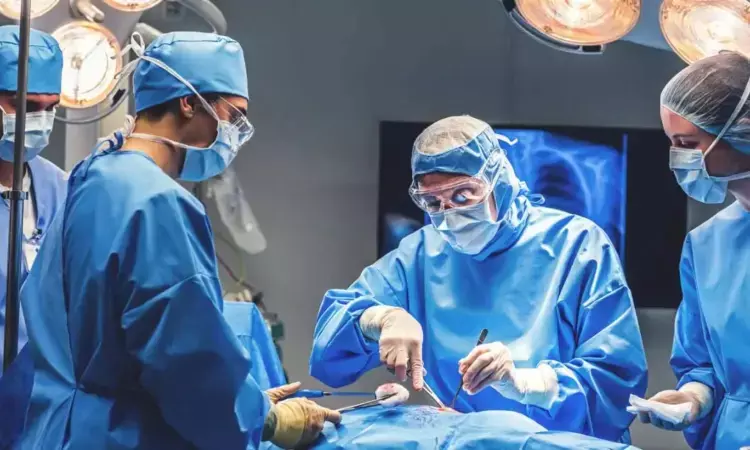- Home
- Medical news & Guidelines
- Anesthesiology
- Cardiology and CTVS
- Critical Care
- Dentistry
- Dermatology
- Diabetes and Endocrinology
- ENT
- Gastroenterology
- Medicine
- Nephrology
- Neurology
- Obstretics-Gynaecology
- Oncology
- Ophthalmology
- Orthopaedics
- Pediatrics-Neonatology
- Psychiatry
- Pulmonology
- Radiology
- Surgery
- Urology
- Laboratory Medicine
- Diet
- Nursing
- Paramedical
- Physiotherapy
- Health news
- Fact Check
- Bone Health Fact Check
- Brain Health Fact Check
- Cancer Related Fact Check
- Child Care Fact Check
- Dental and oral health fact check
- Diabetes and metabolic health fact check
- Diet and Nutrition Fact Check
- Eye and ENT Care Fact Check
- Fitness fact check
- Gut health fact check
- Heart health fact check
- Kidney health fact check
- Medical education fact check
- Men's health fact check
- Respiratory fact check
- Skin and hair care fact check
- Vaccine and Immunization fact check
- Women's health fact check
- AYUSH
- State News
- Andaman and Nicobar Islands
- Andhra Pradesh
- Arunachal Pradesh
- Assam
- Bihar
- Chandigarh
- Chattisgarh
- Dadra and Nagar Haveli
- Daman and Diu
- Delhi
- Goa
- Gujarat
- Haryana
- Himachal Pradesh
- Jammu & Kashmir
- Jharkhand
- Karnataka
- Kerala
- Ladakh
- Lakshadweep
- Madhya Pradesh
- Maharashtra
- Manipur
- Meghalaya
- Mizoram
- Nagaland
- Odisha
- Puducherry
- Punjab
- Rajasthan
- Sikkim
- Tamil Nadu
- Telangana
- Tripura
- Uttar Pradesh
- Uttrakhand
- West Bengal
- Medical Education
- Industry
Fascia iliaca and pericapsular nerve group blocks may bring pain relief in patients undergoing Hip replacement

Patients who receive hip arthroplasty may have moderate to severe pain after surgery, which might negatively impact their long-term prognosis and increase their risk of perioperative complications. Treatments for regional anaesthesia, such as fascia iliaca compartment block (FICB) and pericapsular nerve group block (PENG), improve functional ability and quality of life.
However, there is now little data to refute the analgesic benefits of these techniques. Twelve randomised controlled trials (RCTs) were included in this recently published systematic review and meta-analysis to evaluate the relative efficacy of pericapsular nerve group block (PENG) and fascia iliaca compartment block (FICB) for patients undergoing hip replacement surgery. The primary outcome was the pain score (1–10) using the visual analogue scale (VAS) or numeric rating scale (NRS) at rest and during movement after a 24-hour period. The GRADE method was used to evaluate the data, and it was found that there was intermediate quality evidence for pain ratings at rest and during movement over a period of 30 to 24 hours. PENG block indicated improved analgesia in 30 minutes during movement and during rest, and a 24 hour decrease in postoperative opioid consumption, with a fair degree of confidence in the findings. The study found that PENG block was more effective than suprainguinal or infrainguinal FICB at rest and during movement within 30 minutes. Peripheral nerve blocks are preferred over regular intravenous opioids in the better recovery after surgery protocol because they may decrease pain, speed up the mobility and usage of opioids, and lower the risk of side effects in the early postoperative phase.
Reference –
Prakash, Jay; Rochwerg, Bram1; Saran, Khushboo2; Yadav, Arun K.3; Bhattacharya, Pradip Kumar; Kumar, Amit4; Chaudhuri, Dipayan1; Priye, Shio5. Comparison of analgesic effects of pericapsular nerve group block and fascia iliaca compartment block during hip arthroplasty: A systematic review and meta-analysis of randomised controlled trials. Indian Journal of Anaesthesia 67(11):p 962-972, November 2023. | DOI: 10.4103/ija.ija_672_23.
MBBS, MD (Anaesthesiology), FNB (Cardiac Anaesthesiology)
Dr Monish Raut is a practicing Cardiac Anesthesiologist. He completed his MBBS at Government Medical College, Nagpur, and pursued his MD in Anesthesiology at BJ Medical College, Pune. Further specializing in Cardiac Anesthesiology, Dr Raut earned his FNB in Cardiac Anesthesiology from Sir Ganga Ram Hospital, Delhi.
Dr Kamal Kant Kohli-MBBS, DTCD- a chest specialist with more than 30 years of practice and a flair for writing clinical articles, Dr Kamal Kant Kohli joined Medical Dialogues as a Chief Editor of Medical News. Besides writing articles, as an editor, he proofreads and verifies all the medical content published on Medical Dialogues including those coming from journals, studies,medical conferences,guidelines etc. Email: drkohli@medicaldialogues.in. Contact no. 011-43720751


